Submitted:
21 November 2023
Posted:
22 November 2023
You are already at the latest version
Abstract
Keywords:
1. Introduction
2. Materials and Methods
3. Results
4. Discussion
5. Conclusions
Supplementary Materials
Author Contributions
Funding
Institutional Review Board Statement
Informed Consent Statement
Data Availability Statement
Acknowledgments
Conflicts of Interest
References
- Barnes, D.K.A.; Galgani, F.; Thompson, R.C.; Barlaz, M. Accumulation and fragmentation of plastic debris in global environments. Phil. Trans. Biol. Sci. 2009, 364, 1985-1998. [CrossRef] [PubMed]
- Thompson, R.C., Olsen, Y.; Mitchell, R.P.; Davis, A.; Rowland, S.J.; John, A.W.G.; McGonigle, D.; Russell, A.E. Lost at sea: where is all the plastic? Science, 2004, 304, 838. [CrossRef] [PubMed]
- Gall, S.C.; Thompson, R.C. The impact of debris on marine life. Mar. Pollut. Bull., 2015 92, 170-179. [CrossRef]
- Kühn, S.; van Franeker, J.A. Quantitative overview of marine debris ingested by marine megafauna. Mar. Pollut. Bull. 2020, 151, 110858. [CrossRef] [PubMed]
- Duncan, E.M.; Botterell, Z.L.R.; Broderick, A.C.; Galloway, T.S.; Lindeque, P.K., Nuno, A.; Godley, B.J. A global review of marine turtle entanglement in anthropogenic debris: A baseline for further action. Endanger. Species Res. 2017, 34, 431 - 448. [CrossRef]
- Santos, A.J.B.; Bellini, C.; Bortolon, L.F.; Coluchi, R. Ghost nets haunt the olive ridley turtle (Lepidochelys olivacea) near the Brazilian islands of Fernando de Noronha and Atol das Rocas. Herpetol. Rev. 2012, 43, 245–246.
- Adelir-Alves, J.; Rocha, G.R.A.; Souza, T.F.; Pinheiro, P.C.; Freire, K.M.F. Abandoned, lost, or otherwise discarded fishing gears in rocky reefs of Southern Brazil. Braz. J. Oceanogr., 2016, 64 (4), 427–434. [CrossRef]
- Stelfox, M.; Hudgins, J.; Sweet, M. A review of ghost gear entanglement amongst marine mammals, reptiles and elasmobranchs. Mar. Pollut. Bull. 2016, 111, (1-2), 6–17.
- Azevedo-Santos, V.M.; Marques, L.M.; Teixeira, C.R.; Giarrizzo, T.; Barreto, R.; Rodrigues-Filho, J.L. Digital media reveal negative impacts of ghost nets on Brazilian marine biodiversity. Mar. Pollut. Bull. 2021, 172, 112821. [CrossRef] [PubMed]
- Laist, D.W. Impacts of Marine Debris: Entanglement of Marine Life in Marine Debris Including a Comprehensive List of Species with Entanglement and Ingestion Records. In: Coe, J.M., Rogers, D.B. (Eds.), Marine Debris: Sources, Impacts, and Solutions. Springer, New York, 1997, 99–139. [CrossRef]
- Law, K.L. Plastics in the Marine Environment. Annu. Rev. Mar. Sci. 2017, 9 (1), 205–229. [CrossRef]
- Dolman, S.J.; Moore, M.J. Welfare Implications of Cetacean Bycatch and Entanglements. In: Butterworth, A. (Ed.), Marine Mammal Welfare: Human Induced Change in the Marine Environment and its Impacts on Marine Mammal Welfare. Springer International Publishing, 2017, 41–65. [CrossRef]
- Azevedo-Santos, V.M.; Hughes, R.M.; Pelicice, F.M. Ghost nets: A poorly known threat to Brazilian freshwater biodiversity. An. Acad. Bras. Ciênc., 2022, 94 (1). [CrossRef]
- Goldstein, D.S.; Goodwin, M.C. Gooseneck barnacles (Lepas spp.) ingest microplastic debris in the North Pacific subtropical gyre. Peer. J. 2013, 1, e184. [CrossRef]
- Schuyler, Q.; Wilcox, C.; Townsend, K.; Hardesty, B.; Marshall N. Mistaken identity? Visual similarities of marine debris to natural prey items of sea turtles. BMC Ecol. 2014, 14 ,14. [CrossRef] [PubMed]
- Suaria, G.; Avio, C.G.; Mineo, A.; Lattin, G.L.; Magaldi, M.G.; Belmonte, G.; Moore, C.J.; Regoli, F.; Aliani, S. The Mediterranean Plastic Soup: synthetic polymers in Mediterranean surface waters. Sci. Rep. 2016, 6, 37551. [CrossRef] [PubMed]
- Cózar, A.; Sanz-Martín, M.; Martí, E.; González-Gordillo, J.I.; Ubeda, B.; Gálvez, J.Á.; et al. Plastic accumulation in the Mediterranean Sea. PLoS ONE 2015, 10, 4, 0121762. [CrossRef] [PubMed]
- Coll, M.; Piroddi, C.; Steenbeek, J.; Kaschner, K.; Ben Rais Lasram F, Aguzzi J, et al. The Biodiversity of the Mediterranean Sea: Estimates, Patterns, and Threats. PLoS ONE 2010, 5, 8, e11842. [CrossRef] [PubMed]
- wwf.it 2023. https://www.wwf.it/dove-interveniamo/.
- Angiolillo, M.; di Lorenzo, B.; Farcomeni, A.; Bo, M.; Bavestrello, G.; Santangelo, G.; Cau, A; Mastascusa, V.; Cau, A.; Sacco, F. Distribution and assessment of marine debris in the deep Tyrrhenian Sea (NW Mediterranean Sea, Italy). Marine Pollution Bulletin, 2015, 92, 149–159. [CrossRef] [PubMed]
- Pasquini, G.; Ronchi, F.; Strafella, P.; Scarcella, G., Fortibuoni, T. Seabed litter composition, distribution, and sources in the northern and central Adriatic Sea (Mediterranean). Waste Management, 2016, 58, 41-51. [CrossRef] [PubMed]
- Cau, A.; Alvito, A.; Moccia, D.; Canese, S.; Pusceddu, A.; Rita, C.; Angiolillo, M.; Follesa, M.C. Submarine canyons along the upper Sardinian slope (Central Western Mediterranean) as repositories for derelict fishing gears. Mar. Pollut. Bull. 2017, 123, 357–364. [CrossRef]
- Pierdomenico, M.; Casalbore, D.; Chiocci, F.L. Massive benthic litter funnelled to deep sea by flashflood generated hyperpycnal flows. Sci. Rep. 2019, 9, 1–10. [CrossRef]
- Spedicato, M.T.; Zupa, W.; Carbonara, P.; Fiorentino, F.; Follesa, M.; Galgani, F.; Garcia, C.; Jadaud, A.; Ioakeimidis, C.; Lazarakis, G.; et al. Spatial Distribution of Marine Macro-Litter on the Seafloor in the Northern Mediterranean Sea: The MEDITS Initiative. Sci. Mar. 2019, 83. [CrossRef]
- Garofalo, G.; Quattrocchi, F.; Bono, G.; Di Lorenzo, M.; Di Maio, F.; Falsone, F.; Gancitano, V.; Geraci, M.L.; Lauria, V.; Massi, D.; et al. What Is in Our Seas? Assessing Anthropogenic Litter on the Seafloor of the Central Mediterranean Sea. Environ. Pollut. 2020, 266, 115213. [CrossRef]
- Pierdomenico, M.; Casalbore, D.; Chiocci, F.L. The key role of canyons in funnelling litter to the deep sea: a study of the Gioia canyon (southern Tyrrhenian Sea). Anthropocene 2020, 30, 100237. [CrossRef]
- Suaria, G.; Aliani, S. Floating debris in the Mediterranean Sea. Mar. Pollut. Bull. 2014, 86, 494–504. [CrossRef] [PubMed]
- Munari, C.; Corbau, C.; Simeoni U.; Mistri, M. Marine litter on Mediterranean shores: analysis of composition, spatial distribution, and sources in north-western Adriatic beaches. Waste Manag. 2016, 49, 483-490. [CrossRef] [PubMed]
- Vlachogianni, T.; Fortibuoni, T.; Ronchi, F.; Zeri, C.; Mazziotti, C., Tutman, P.; Varezić, D.B.; Palatinus, A.; et al. Marine litter on the beaches of the Adriatic and Ionian seas: an assessment of their abundance, composition, and sources. Mar. Pollut. Bull. 2018, 131, 745–756. [CrossRef] [PubMed]
- Mancuso, M.; Genovese, G; Porcino, N.; Natale, S.; Spagnuolo, D.; Morabito, M.; Bottari, T. Psammophytes as traps for beach litter in the Strait of Messina (Mediterranean Sea). Reg. Stud. Mar. Sci. 2023, 65, 103057. [CrossRef]
- Porcino N., Bottari T., Falco F., Natale S., Mancuso, M. Posidonia spheroids entrapping plastic litter: Implication for beach clean-ups. Sustainability, 2023, 15 (22), 15740. [CrossRef]
- Fossi, M.C.; Coppola, D.; Baini, M.; Giannetti, M.; Guerranti, C.; Marsili, L., Clò, S. Large filter feeding marine organisms as indicators of microplastic in the pelagic environment: the case studies of the Mediterranean basking shark (Cetorhinus maximus) and fin whale (Balaenoptera physalus). Mar. Environ. Res. 2014, 100, 17–24. [CrossRef] [PubMed]
- Biagi, E.; Musella, M.; Palladino, G.; Angelini, V.; Pari, S.; Roncari, C.; Candela, M. Impact of Plastic Debris on the Gut Microbiota of Caretta caretta From North-western Adriatic Sea. Front. Mar. Sci. 2021, 8, 127.
- Bottari, T.; Mancuso, M.; Pedà, C.; De Domenico, F.; Laface, F.; Schirinzi, G.F.; Battaglia, P.; Consoli, P.; Spanò, N.; Greco, S.; Romeo, T. Microplastics in the bogue, Boops boops: a snapshot of the past from the southern Tyrrhenian Sea. J. Hazard. Mater. 2022, 424, 127669. [CrossRef]
- Zitouni, N.; Cappello, T.; Missawi, O.; et al Metabolomic disorders unveil hepatotoxicity of environmental microplastics in wild fish Serranus scriba (Linnaeus 1758). Sci. Total Environ. 2022, 838, 155872. [CrossRef]
- Santonicola, S.; Volgare, M.; Di Pace, E.; Mercogliano, R.; Cocca, M.; Raimo, G.; Colavita, G. Research and characterization of fibrous microplastics and natural microfibers in pelagic and benthic fish species of commercial interest. Ital. J. Food Safety 2023, 8, 12(1), 11032. [CrossRef]
- Quaglia, N.C.; Capuozzo, F.; Ceci, E.; Cometa, S.; Di Pinto, A.; Mottola, A.; Piredda, R.; Dambrosio, A. Preliminary survey on the occurrence of microplastics in bivalve mollusks marketed in Apulian fish markets. Italian Journal of Food Safety, 2023, 8, 12(2), 10906. [CrossRef]
- D’ambrosio, A.; Cometa, S.; Capuozzo, F.; Ceci, E.; Derosa, M.; Quaglia, N.G. Occurrence and Characterization of Microplastics in Commercial Mussels (Mytilus galloprovincialis) from Apulia Region (Italy). Foods 2023, 12, 1495. [CrossRef] [PubMed]
- Cau, A.; Avio, C.G.; Dessì, C.; Follesa, M.C.; Moccia, D.; Regoli, F.; Pusceddu, A. Microplastics in the crustaceans Nephrops norvegicus and Aristeus antennatus: Flagship species for deep-sea environments? Environ. Pollut. 2019, 255. 113107. [CrossRef]
- Roman, L.; Schuyler, Q.; Wilcox, C.; Hardesty, B.D. Plastic pollution is killing marine megafauna, but how do we prioritize policies to reduce mortality? Conserv. Lett. 2021, 14, 2, e12781. [CrossRef]
- Mghili, B.; Keznine, M.; Analla, M.; Aksissou, M. The impacts of abandoned, discarded, and lost fishing gear on marine biodiversity in Morocco. Ocean. Coast. Manag. 2023, 239, 106593. [CrossRef]
- IUCN, 2022. The IUCN red list of threatened species. Version 2022–2. https://www. iucnredlist.org. (accessed on 30 October 2023).
- Russo, G.; Di Bella, C.; Loria, G.R.; Insacco, G.; Palazzo, P.; Violani, C.; Zava, B. Notes on the influence of human activities on sea chelonians in Sicilian waters. J. Mt. Ecol. 2003, 7, 37-41.
- Jacobsen, J.K.; Massey, L.; Gulland, F. Fatal ingestion of floating net debris by two sperm whales (Physeter macrocephalus) Mar. Pollut. Bull. 2010, 60(5), 765-7. [CrossRef] [PubMed]
- Barreiros, J.P.; Raykov, V.S. Lethal lesions and amputation caused by plastic debris and fishing gear on the loggerhead turtle Caretta caretta (Linnaeus, 1758). Three case reports from Terceira Island, Azores (NE Atlantic), Mar. Pollut. Bull. 2014, 86, 518-522. [CrossRef] [PubMed]
- Benhardouze, W.; Aksissou, M.; Tiwari, M. Analysis of digestive tract contents from loggerhead sea turtles Caretta caretta (Linnaeus, 1758) stranded along the Northwest coast of Morocco. Cah. Biol. Mar. 2021, 62 (3), 205–215. [CrossRef]
- Orós, J.; Camacho, M; Calabuig, P.; Rial-Berriel, C.; Montesdeoca, N.; Déniz, S.; Luzardo, O.P. Postmortem investigations on leatherback sea turtles (Dermochelys coriacea) stranded in the Canary Islands (Spain) (1998–2017): Evidence of anthropogenic impacts. Mar. Pollut. Bull. 2021, 167. 112340. [CrossRef] [PubMed]
- Rodriguez, Y.; Vandeperre, F.; Santos, M.R.; Herrera, L.; Parra, H.; Deshpande, A.; Bjordal, K.A.; Pham, C.K.; Litter ingestion and entanglement in green turtles: An analysis of two decades of stranding events in the NE Atlantic. Environ. Pollut. 2022, 298. 118796. [CrossRef]
- Solomando, A.; Pujoil, F.; Sureda, A.; Pinya, S. Evaluating the Presence of Marine Litter in Cetaceans Stranded in the Balearic Islands (Western Mediterranean Sea). Biology 2022, 11(10), 1468. [CrossRef]
- Mghili, B.; Benhardouze, W.; Aksissou, M.; Tiwari, M. Sea turtle strandings along the Northwestern Moroccan coast: Spatio-temporal distribution and main threats. Ocean. Coast. Manag. 2023, 237, 106539. [CrossRef]
- Lavers, J.L.; Sharp P.B.; Stuckenbrock, S.; Bond A.L. Entrapment in plastic debris endangers hermit crabs. J. Hazard. Mat. 2020, 387. 121703. [CrossRef] [PubMed]
- Parton, K.J.; Galloway, T.S.; Godley, B.J. Global review of shark and ray entanglement in anthropogenic marine debris. Endang. Species Res. 2019, 39, 173–190. [CrossRef]
- Wegner, N.C.; Cartamil, D.P. Effects of prolonged entanglement in discarded fishing gear with substantive biofouling on the health and behavior of an adult shortfin mako shark, Isurus oxyrinchus. Mar. Pollut. Bull. 2012, 64, 391–394. [CrossRef] [PubMed]
- Mucientes, G.; Queiroz, N. Presence of plastic debris and retained fishing hooks in oceanic sharks. Mar. Pollut. Bull. 2019, 143, 6-11. [CrossRef]
- Perroca, J.F.; Giarrizzo, T.; Azzurro, E.; Luiz Rodrigues-Filho, J.L.; Silva, C.V.; Arcifa, M. S.; Azevedo-Santos, V.M. Negative Effects of Ghost Nets on Mediterranean Biodiversity. Aquatic Ecology, 2022. [CrossRef]
- Thiel, M.; Luna-Jorquera, G.; Alvarez-Varas, R.; Gallardo, C.; Hinojosa, I.A.; Luna, N.; Miranda-Urbina, D.; Morales, N.; Ory, N.; Pacheco, A.S.; Portflitt-Toro, M.; Zavalaga, C. Impacts of marine plastic pollution from continental coasts to subtropical gyres—fish, seabirds, and other vertebrates in the SE pacific. Front. Mar. Sci., 2018, 5, 238. [CrossRef]
- Afonso, S.; Fidelis, L. The fate of plastic-wearing sharks: Entanglement of an iconic top predator in marine debris. Mar. Pollut. Bull. 2023, 194, 115326. [CrossRef]
- Barreto, R., Bornatowski, H., Fiedler, F.N., Pontalti, M., da Costa, K.J., Nascimento, C., Kotas, J.E., 2019. Macro-debris ingestion and entanglement by blue sharks (Prionace glauca Linnaeus, 1758) in the temperate South Atlantic Ocean. Mar. Pollut. Bull. 2019, 145, 214–218. [CrossRef]
- Sazima, I., Gadig, O.B.F., Namora, R.C., Motta, F.S. Plastic debris collars on juvenile carcharhinid sharks (Rhizoprionodon lalandii) in Southwest Atlantic. Mar. Pollut. Bull. 2002, 44, 1147–1149. [CrossRef]
- Savels, R.; Raes, L.; Papageorgiou, M.; Speelman, S. Economic assessment of abandoned, lost and otherwise discarded fishing gear (ALDFG) in the fishery sector of the Republic of Cyprus. Gland, Switzerland: IUCN. 2022, 38.
- www.unep.org/unepmap/fr/node/4260?%2Fnode%2F4260, 2015. 4260.
- Bo, M.; Bava, S.; Canese, S.; Angiolillo, M.; Cattaneo-Vietti, R.; Bavestrello, G. Fishing impact on deep Mediterranean rocky habitats as revealed by ROV investigation. Biological Conservation, 2014, 171: 167–176.
- Tubau, X.; Canals, M; Lastras, G; Rayo, X.; Rivera, J.; Amblas, D. Marine litter on the floor of deep submarine canyons of the Northwestern Mediterranean Sea: The role of hydrodynamic processes. Progress in Oceanography, 2015, 134: 379–403.
- Woods, J.S.; Verones, F.; Jolliet, O.; V ́azquez-Rowe, I.; Boulay, A.M. A frameworkfor the assessment of marine litter impacts in life cycle impact assessment. Ecol. Ind. 2021, 129, 107918. [CrossRef]
- Høiberg, M.A.; Woods, J.S.; Verones, F. Global distribution of potential impact hotspots for marine plastic debris entanglement. Ecol. Ind. 2022, 135, 108509. [CrossRef]
- Karris, G.; Savva, I.; Kakalis, E.; Bairaktaridou, K.; Espinosa, C.; Smith, M. S.; Botsidou, P.; Moschous, S.; Voulgaris, M.D.: Peppa, E.; Panayides, P.; Hadjistyllis, H.; Iosifides, M. First sighting of a pelagic seabird entangled in a disposable COVID-19 facemask in the Mediterranean Sea. Medit. Mar. Sci. 2023, 24 (1): 50 - 55. [CrossRef]
- Gramentz, D. Involvement of loggerhead turtle with plastic, metal, and hydrocarbon pollution in the central Mediterranean. Mar. Pollut. Bull. 1988, 19, 11–13. [CrossRef]
- Tomás, J.; Guitart, R.; Mateo, R.; Raga, J.A. Marine debris ingestion in loggerhead sea turtles, Caretta caretta, from the Western Mediterranean. Mar. Pollut. Bull. 2002, 44, 211–216. [CrossRef]
- Casale, P.; Abbate, G.; Freggi, D.; Conte, N.; Oliviero, M.; Argano, R. Foraging ecology of loggerhead sea turtle Caretta caretta in the central Mediterranean Sea: evidence for a relaxed life history model. Marine Ecology Progress Series, 2008, 372, 265– 276. [CrossRef]
- azar, B.; Gracan, R. Ingestion of marine debris by loggerhead sea turtles, Caretta caretta, in the Adriatic Sea. Mar. Pollut. Bull. 2011, 62, 43–47. [CrossRef]
- Campani, T.; Baini, M.; Giannetti, M.; Cancelli, F.; Mancusi, C.; Serena, F.; Marsili, L.; Casini, S.; Fossi, M.C. Presence of plastic debris in loggerhead turtle stranded along the Tuscany coasts of the Pelagos Sanctuary for Mediterranean Marine Mammals (Italy). Mar. Pollut. Bull. 2013, 74, 225–230. [CrossRef]
- Mrosovsky,N.; Ryan, G.D. ; James, M.C. Leatherback turtles: the menace of plastic. Mar. Pollut. Bull. 2009, 58, 287-289. [CrossRef] [PubMed]
- Schuyler, Q.; Hardesty, B.D.; Wilcox, C.; Townsend, K. Global analysis of anthropogenic debris ingestion by sea turtles. Conserv. Biol. 2014, 28: 129–139. [CrossRef] [PubMed]
- Pace, D.S; Miragliuolo, A.; Mussi, B. Behaviour of a social unit of sperm whales (Physeter macrocephalus) entangled in a driftnet off Capo Palinuro (Southern Tyrrhenian Sea, Italy). J. Cetacean Res. Manag. 2008, 10(2), 131-135. [CrossRef]
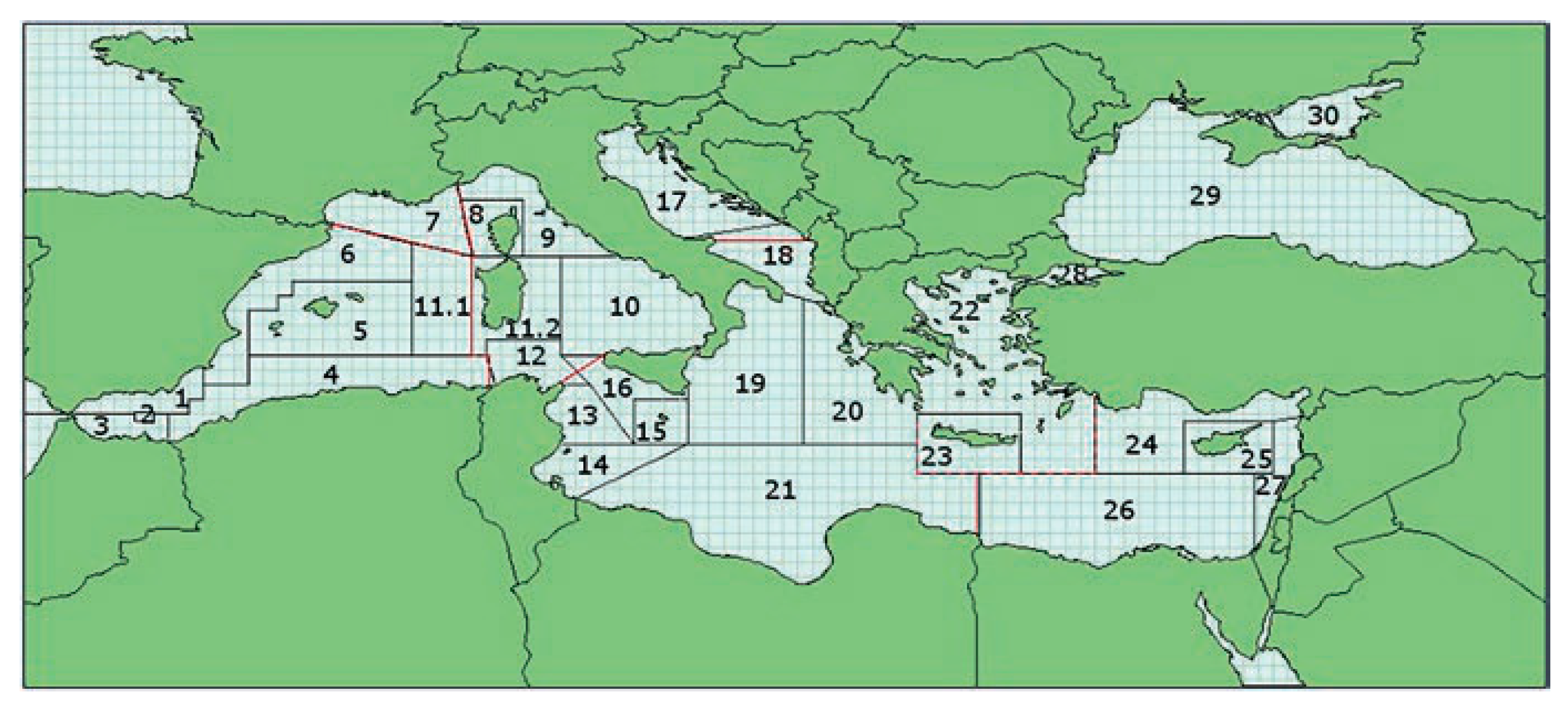
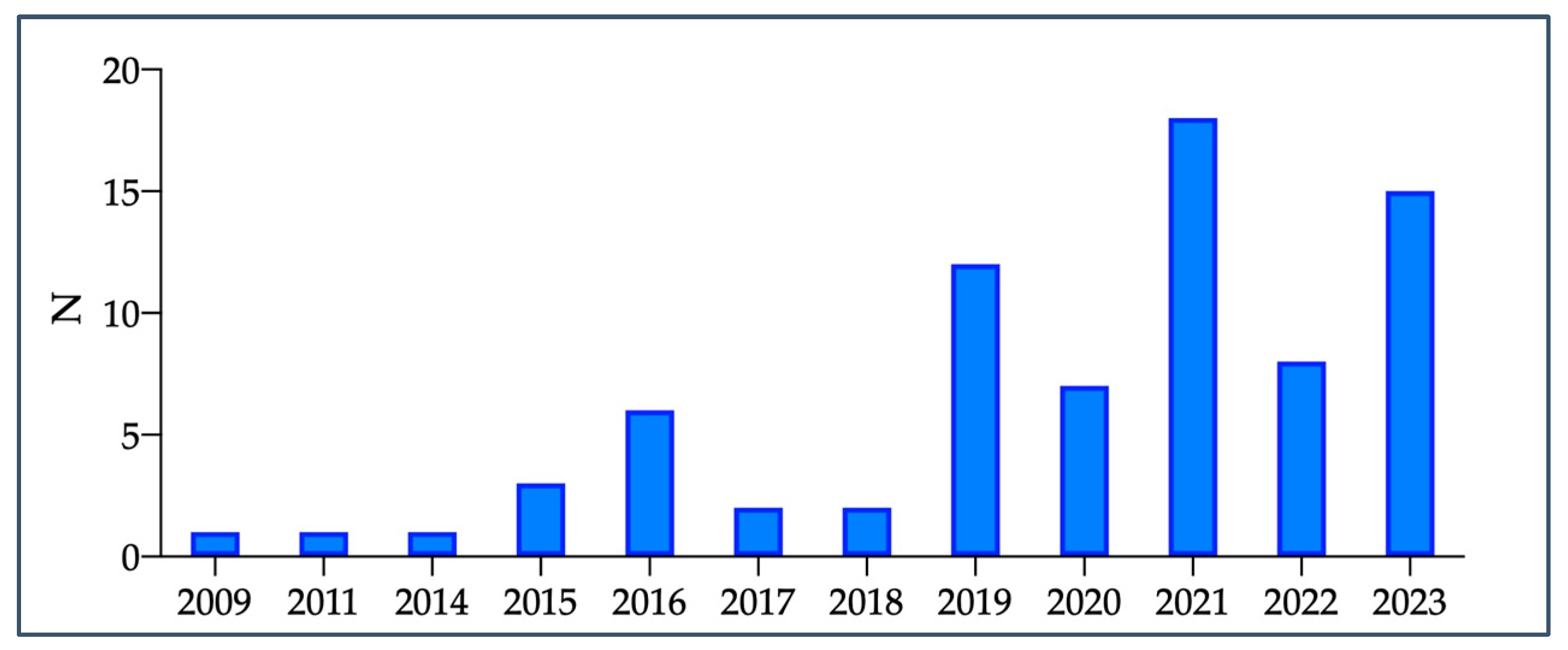
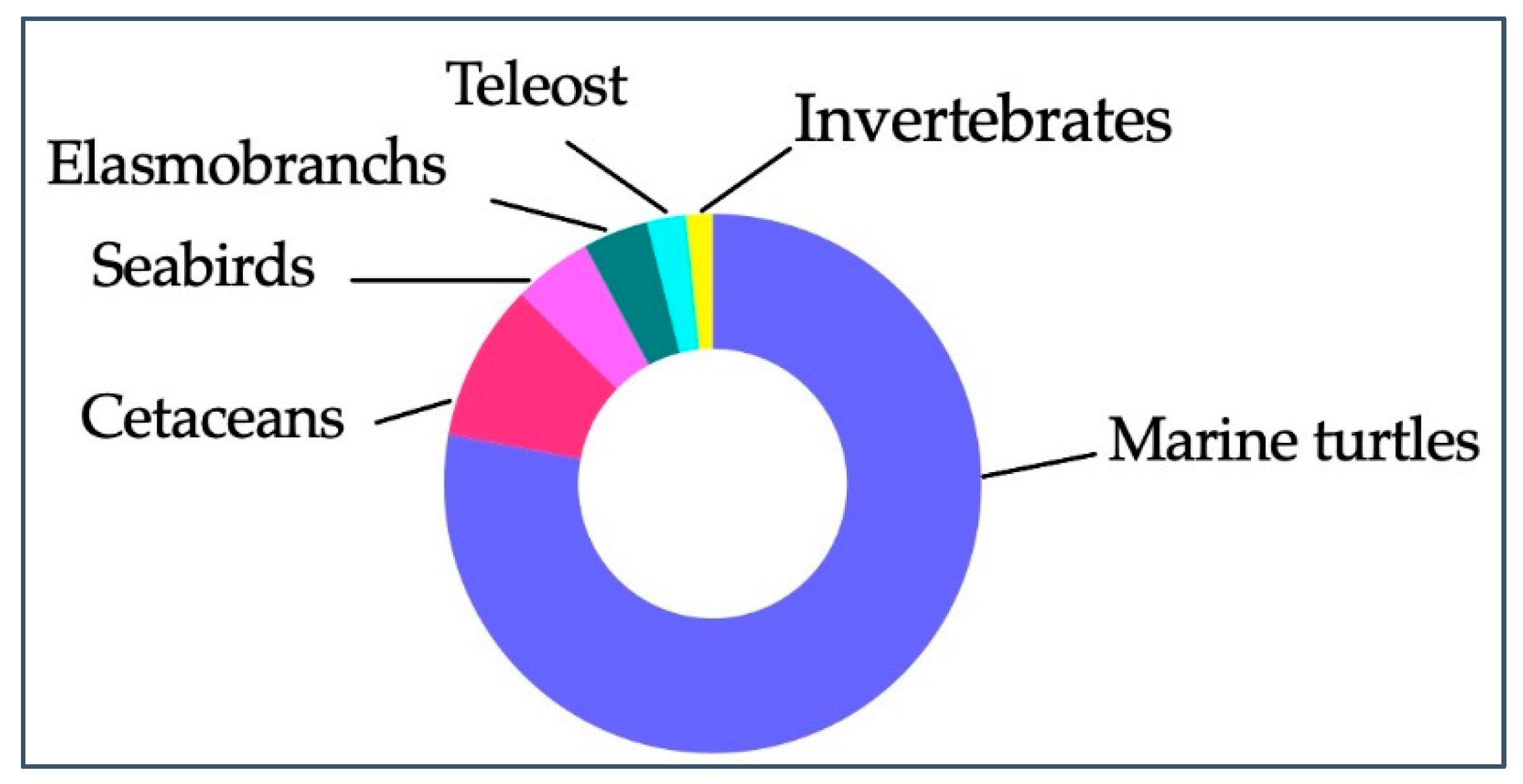
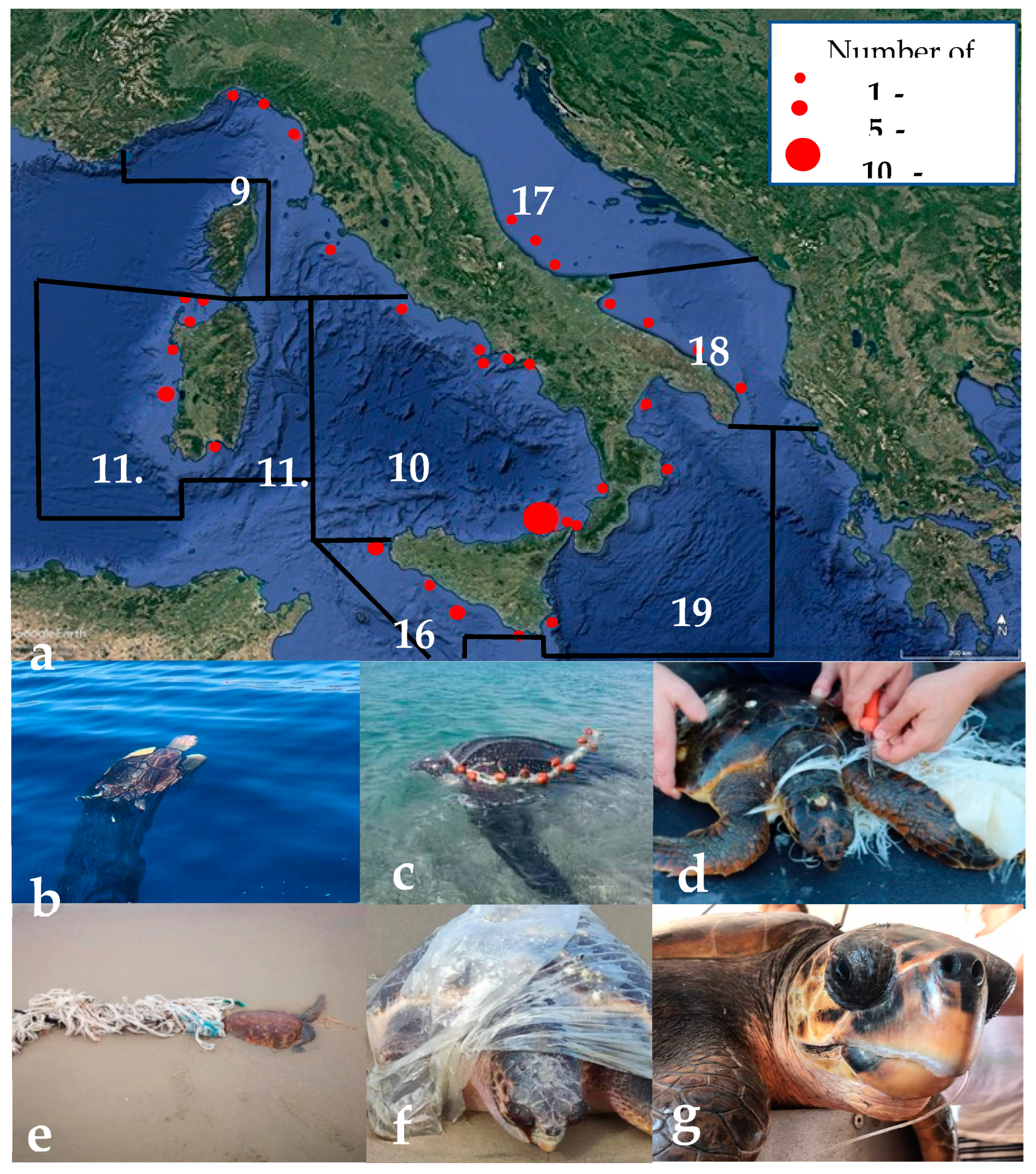
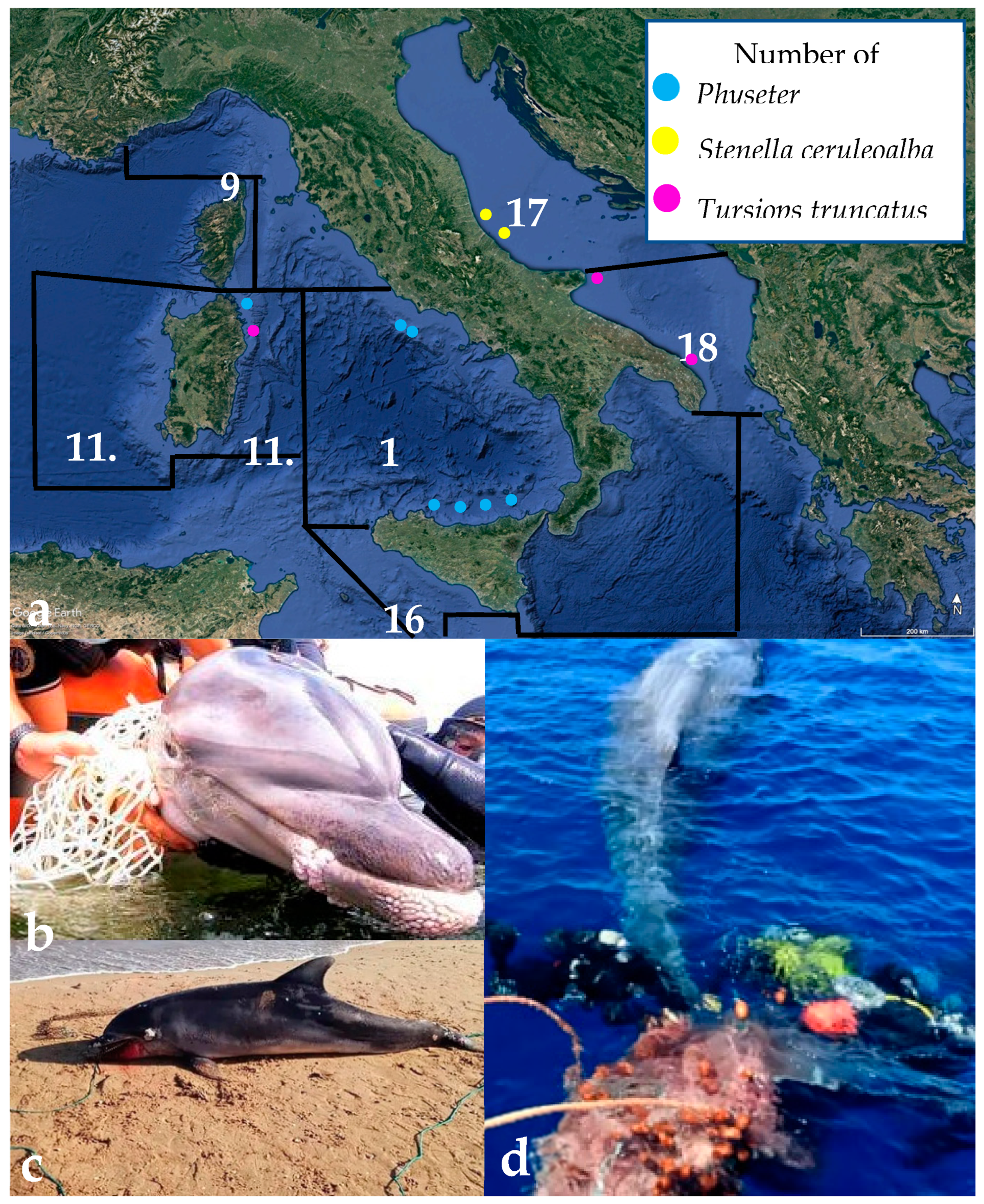
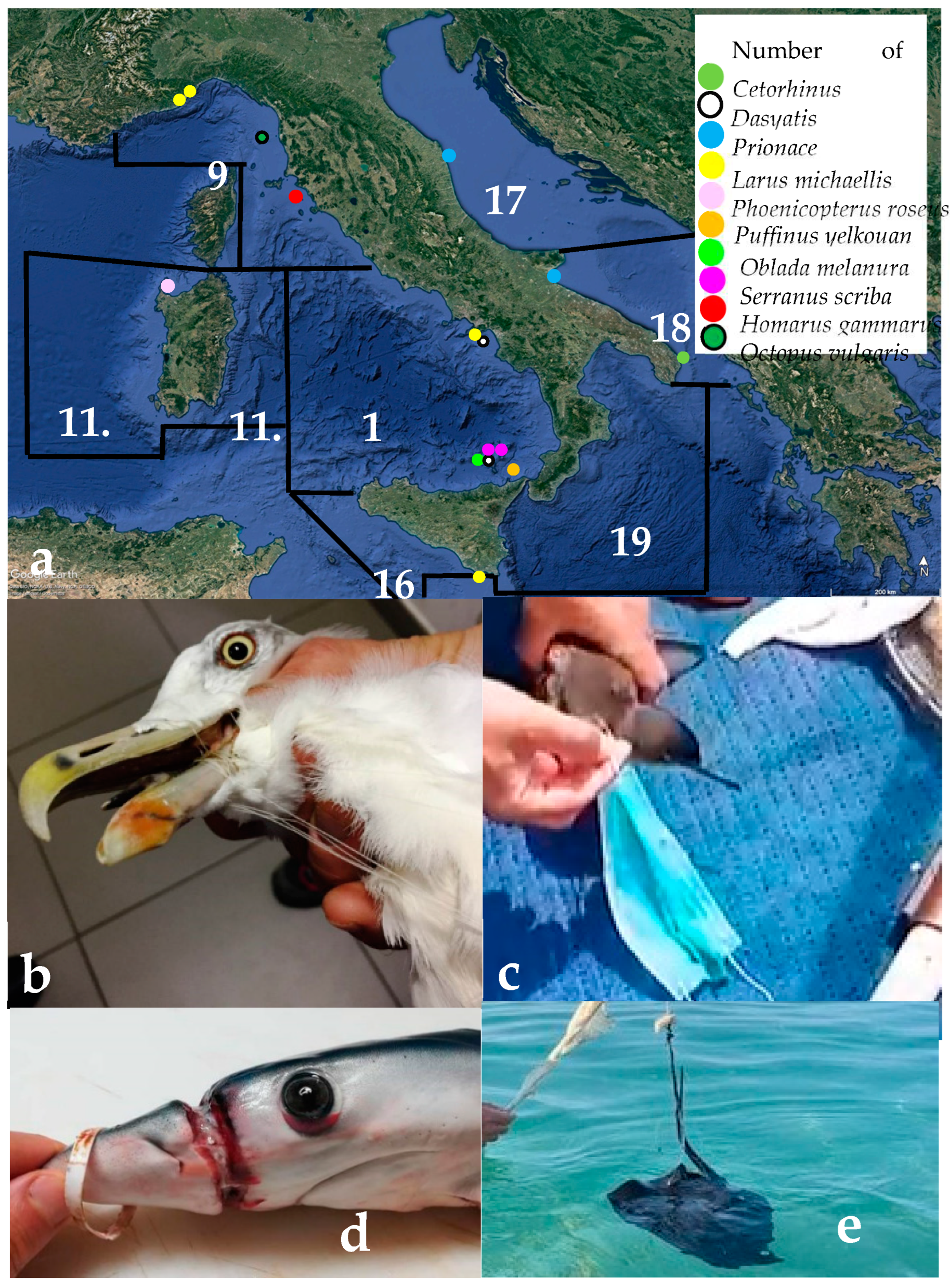
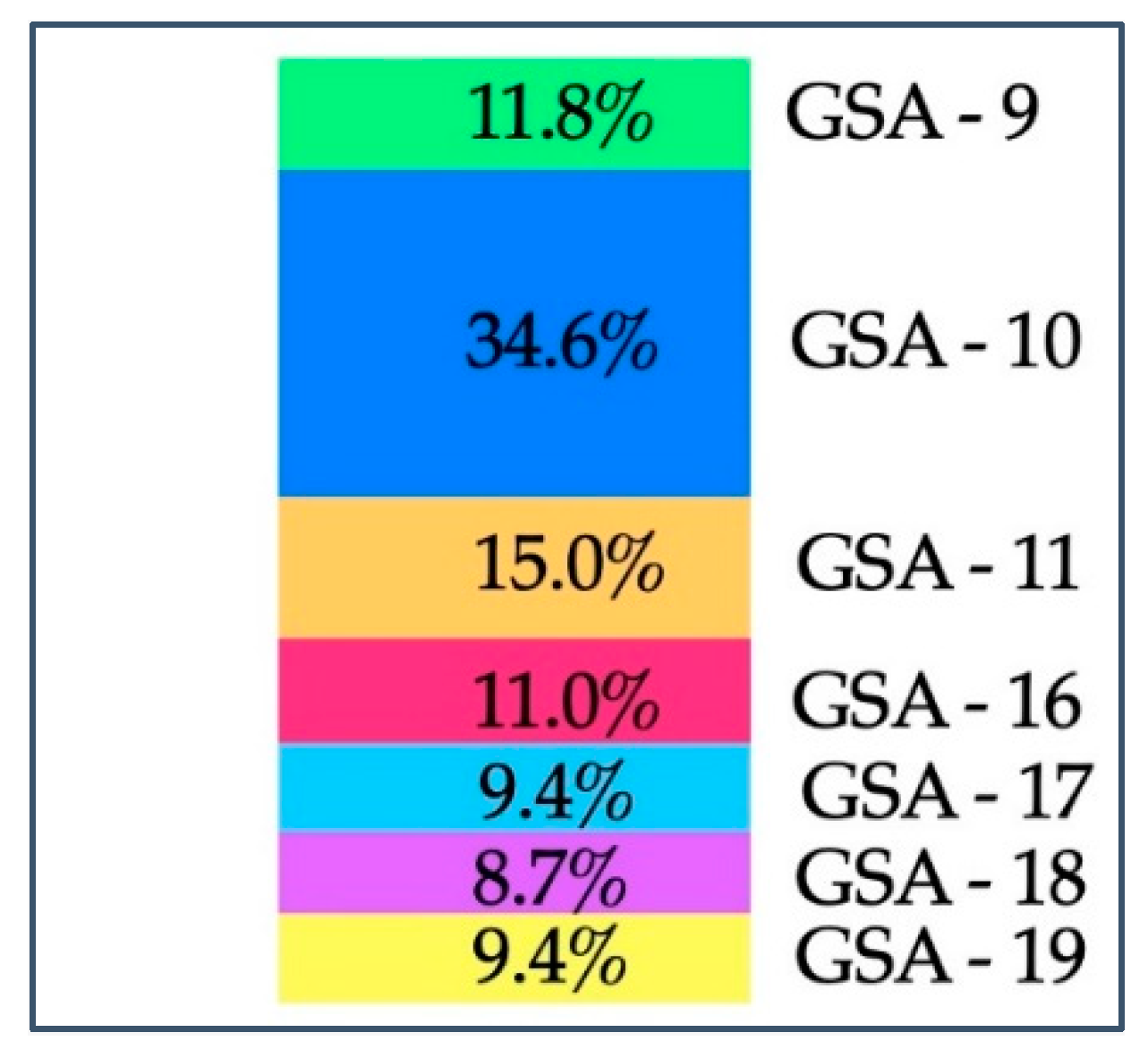
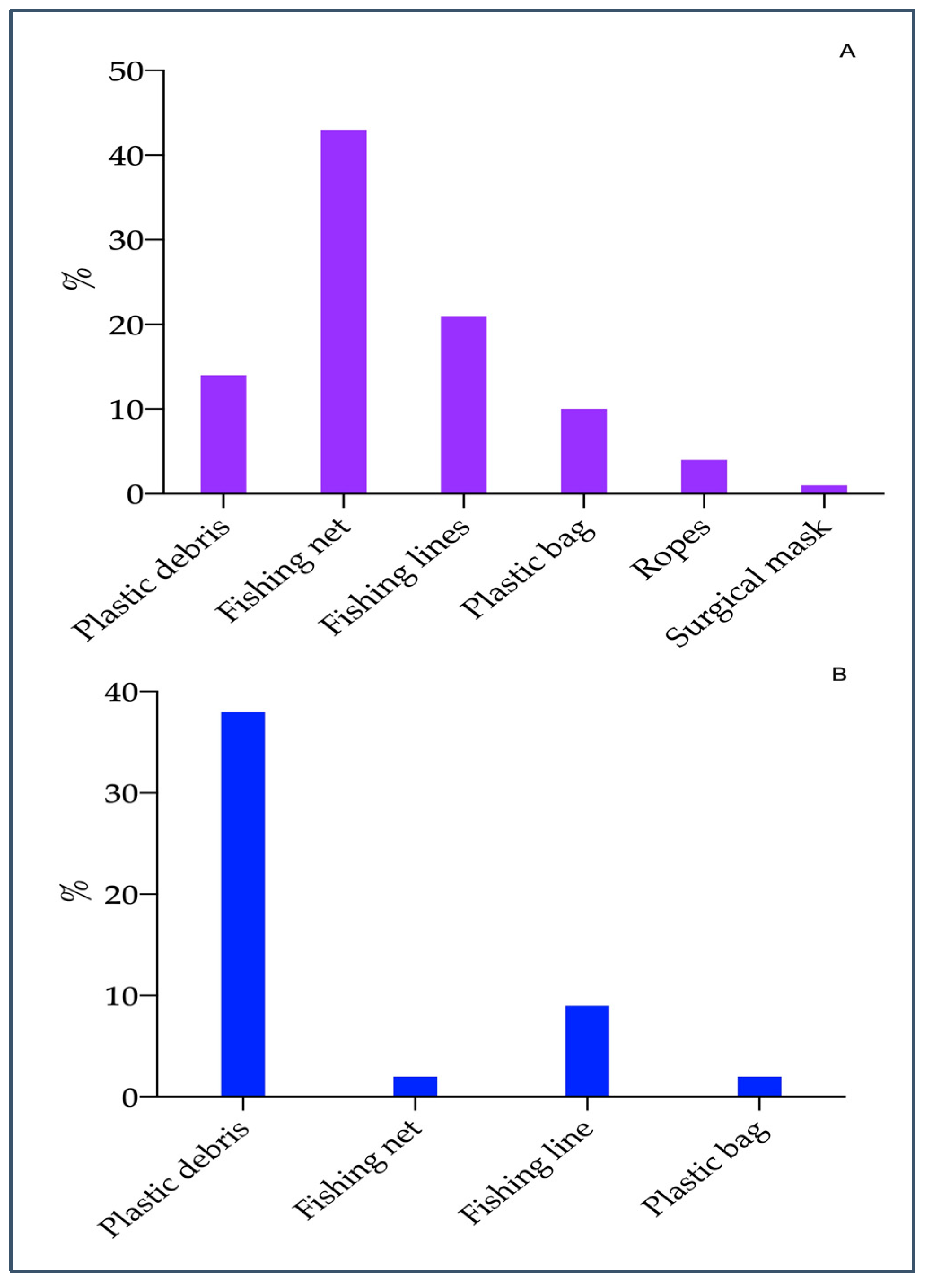
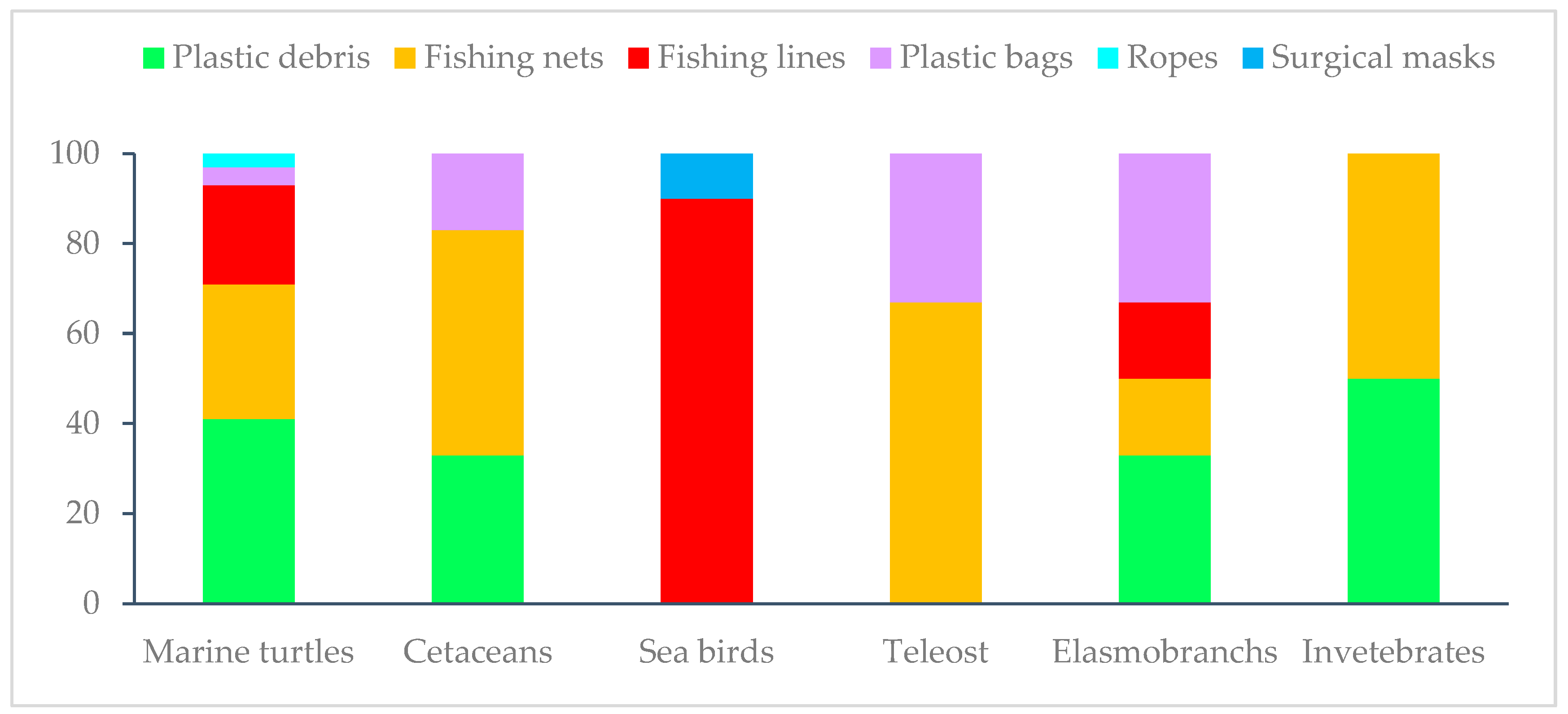
Disclaimer/Publisher’s Note: The statements, opinions and data contained in all publications are solely those of the individual author(s) and contributor(s) and not of MDPI and/or the editor(s). MDPI and/or the editor(s) disclaim responsibility for any injury to people or property resulting from any ideas, methods, instructions or products referred to in the content. |
© 2023 by the authors. Licensee MDPI, Basel, Switzerland. This article is an open access article distributed under the terms and conditions of the Creative Commons Attribution (CC BY) license (http://creativecommons.org/licenses/by/4.0/).




